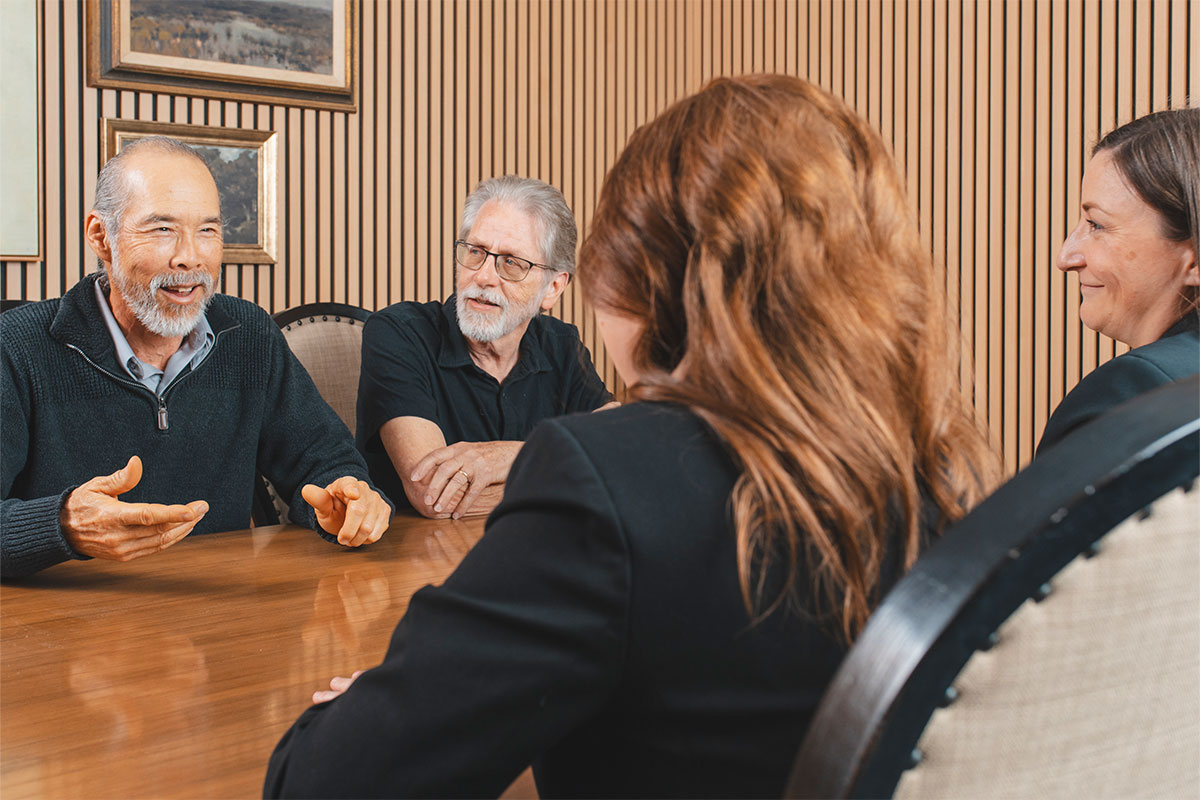Wills and trusts are your master plan for what happens to your earthly possessions once you die. A will specifies who gets what from your estate, which includes your property, money, and belongings. A trust is a legal arrangement where you transfer ownership of your assets to a trustee, who can manage these assets for the benefit of someone else, like a family member. Our wills and trusts attorneys in Rocklin and Roseville will ensure your loved ones are taken care of after you’re no longer around to call the shots.
What’s the difference between wills and trusts?
A will comes into play after you’ve passed on and serves as a set of instructions for distributing your assets among beneficiaries. It undergoes probate, a court-supervised process that validates the will and oversees the transfer of assets to heirs. A will lets you dictate who gets what when you’re gone. It’s your chance to call the shots from beyond the grave, whether it’s divvying up your prized vinyl collection or leaving the family mansion to your favorite niece.
Trusts, on the other hand, kick into action as soon as they’re established, allowing you to transfer ownership of your assets to a trustee during your lifetime. This trustee manages the assets according to your instructions, which can include distributing them to beneficiaries immediately or at specified intervals. Unlike a will, a trust typically bypasses probate, offering privacy, efficiency, and often cost savings in the distribution of your estate.
Schedule a consultation with our legal team and speak with a wills and trusts attorney in Rocklin and Roseville.

Why do I need to establish wills and trusts?
You’ve spent a lifetime amassing your wealth, whether it’s a modest nest egg or a vast empire of assets. Without a will or trust in place, you’re leaving the fate of your hard-earned treasures up to chance. Do you really want your possessions to end up in the hands of distant relatives you barely knew existed? Probably not. With an estate plan, you can dictate exactly how you want your assets distributed and spare your family the headache of squabbling over your estate.
Strategies we use to draft wills and trusts
Conducting a thorough assessment
Before drafting your estate plan, our attorneys conduct a thorough assessment of your assets, liabilities, and familial dynamics. We delve into your circumstances to ensure that every aspect of your estate plan aligns with your wishes and goals. By understanding your concerns, we tailor our approach to draft wills and trusts that serve your best interests.
Crafting personalized wills and trusts
When it comes to estate planning, one size does not fit all. At Goff Legal, PC, our wills and trusts attorneys in Rocklin and Roseville craft personalized plans tailored to your specific needs. Whether you want to minimize tax obligations, provide for loved ones with special needs, or support charitable causes, we design strategies that reflect your individual priorities and preferences.
Protecting your estate from tax liabilities
Protecting your estate from taxes requires foresight and strategic planning. Our attorneys use proactive tax planning techniques to minimize tax liabilities and maximize the value of your estate for future generations. Through trusts, gifting strategies, and other methods, we help you preserve your wealth and minimize the burden of taxes on your beneficiaries.
Conducting periodic reviews and adjustments
Estate planning is not a one-and-done endeavor; it requires periodic review and adjustments to accommodate life changes, such as marriage, divorce, or the birth of a child, and evolving laws. Our team provides ongoing support to ensure your wills and trusts in California remain up-to-date and reflective of your current circumstances.
Common reasons to draft wills and trusts:
- Ensure your family members are provided for after you’re gone
- Sidestep the lengthy and often costly probate process by establishing a trust
- Allow for a smoother transfer of assets to your beneficiaries
- Plan your estate to minimize tax liabilities and preserve your wealth for your heirs
- Keep your affairs out of the public record by utilizing trusts
- Establish trusts tailored to the unique needs of beneficiaries with disabilities
- Specify detailed instructions for asset distribution to prevent disputes among heirs
- Leave a lasting legacy by including provisions for charitable donations in your estate plan
- Shield your assets from creditors or lawsuits by placing them in certain types of trusts
Do I Need a Will or a Trust?

Helpful Video Resources
Establishing Trusts and Writing Wills FAQs
What are some common mistakes people make in writing a will?
Writing a will is one of the most important steps in securing your family’s future and ensuring your wishes are honored. Yet many people unintentionally make errors that can cause disputes or even render the document invalid. Here are some of the most common mistakes:
- Failing to update the will: Life events such as marriage, divorce, the birth of children or grandchildren, or acquiring new property should prompt revisions to your will. If it isn’t updated, loved ones may be unintentionally excluded or disputes may arise.
- Using vague or unclear language: A will must be precise. Simply leaving “my house” without specifying the address or legal description can create confusion if you own multiple properties. Ambiguous wording often leads to disagreements or misinterpretations in court.
- Not naming alternates: If your chosen executor dies before you or declines to serve, and you have not named an alternate, the court will appoint someone you may not have chosen. Without specifying alternates, your assets may be distributed to unintended recipients.
- Relying on DIY templates: Online forms or handwritten wills may not meet state-specific requirements, such as witness signatures, notarization, or particular legal phrasing. These can invalidate your will and force your estate into intestacy.
- Overlooking taxes, debts, and non-probate assets: A will that only names heirs for physical property ignores larger issues such as outstanding debts, estate taxes, or assets like retirement accounts and life insurance policies that pass directly to named beneficiaries. A comprehensive estate plan ensures your entire financial picture is addressed.
Do I need to hire an attorney if I want to establish a trust for my family?
While it is technically possible to establish a trust without an attorney, doing so comes with significant risks. Trusts are complex legal documents that must comply with state-specific laws and meet strict requirements to be valid. Errors in drafting or funding the trust, such as transferring ownership of assets into the trust, can undermine its effectiveness.
An experienced estate planning attorney can help you determine which type of trust best meets your goals. For example, a revocable living trust allows you to maintain control of your assets during your lifetime, while an irrevocable trust may protect assets from creditors. Special needs trusts, charitable trusts, and generation-skipping trusts each have unique benefits.
In California, there are also technical requirements for properly funding a trust. Real estate, for instance, must be retitled with a new deed naming the trustee. Bank accounts, investment accounts, and even business interests must be transferred to the trust to avoid probate. Many people set up trusts but fail to transfer assets, which renders the trust largely ineffective.
Hiring an attorney ensures your trust is legally sound, tailored to your family’s situation, and properly funded. This helps avoid probate and ensures your intentions will be honored.
When do they read the will after someone has passed away?
The idea of a dramatic “reading of the will” in front of family members is largely a myth popularized by movies and television. In practice, the will is not read aloud formally. Instead, after a person’s death, the executor locates the will and files it with the probate court. In California, the law requires the will to be filed within 30 days of the testator’s death.
Once filed, the will becomes part of the probate process, which validates the document and gives the executor authority to act. At this point, the will is a public record, and any interested party can obtain a copy through the court. The timeline for this process varies, but generally, beneficiaries are notified within weeks to a few months after the death.
How are beneficiaries notified?
After the will is filed with the probate court, the executor has a legal duty to notify all beneficiaries named in the will, as well as heirs who would have inherited under intestate succession if no will existed. This is done through a formal notice, often mailed to the beneficiaries, which informs them of the probate proceeding, their potential inheritance, and their right to contest the will if they believe it is invalid.
In California, Probate Code Section 8200 requires the custodian of the will (the person who has possession of it) to deliver the original will to the court and mail a copy to the executor and beneficiaries. The executor must also file a petition for probate, and notice of the hearing is mailed to all interested parties. This provides heirs with the opportunity to raise objections before the process proceeds.
Who is required to get a copy of my will before I die?
Before your death, no one other than you, your drafting attorney, and the two witnesses who sign the will is required to see the document. You may share a copy with your executor so they know where to find the original when the time comes. However, there is no legal obligation to provide a copy to beneficiaries, family members, or anyone else while you are alive.
It is wise to at least inform your executor of the existence and location of your will, whether it is stored in a safe deposit box, at home, or with your attorney. Keeping the will accessible helps avoid confusion or disputes after your death. Providing copies to beneficiaries while you are alive is optional, and many people choose not to do so to preserve privacy and flexibility.
What are the legal requirements for establishing a legitimate trust in California?
In California, a trust must meet several legal requirements to be considered valid:
- Capacity: The person creating the trust (the settlor) must be at least 18 years old and of sound mind.
- Intent: The settlor must clearly express an intention to create a trust. This is typically done through a written trust document.
- Trust property: There must be identifiable property placed into the trust, known as the “trust corpus.” This can include real estate, bank accounts, investments, or personal property.
- Trustee: A trustee must be named to manage the assets. The trustee can be the settlor, another individual, or a professional fiduciary.
- Beneficiaries: The trust must name beneficiaries who will receive the assets in accordance with the trust terms.
- Lawful purpose: The trust must be created for a lawful purpose and cannot violate public policy.
California law also requires certain formalities for specific types of trusts. For example, if the trust holds real estate, a new deed must be recorded with the county to transfer ownership into the trust. If the trust is irrevocable, additional tax considerations and requirements may apply. Without these elements, a trust may be deemed invalid, leaving assets subject to probate.
How do I know if I need a will or a trust?
Everyone should have a will, but many families benefit even more from a trust. A will directs how your solely owned assets are distributed after you pass, but it must go through probate, which can be public, time-consuming, and sometimes costly.
A trust, on the other hand, allows you to transfer assets during your lifetime and after your death with greater privacy. If you want to avoid probate, provide structured distributions for loved ones, or protect assets for children or blended families, a trust may be the better choice.
What are the most common myths about trusts?
A common misconception is that trusts are only for the very wealthy. In reality, many families use trusts to simplify estate administration, protect inheritances, and maintain privacy. Another myth is that trusts are too expensive or complex. While they do require professional drafting, the long-term savings in time, probate costs, and family disputes often outweigh the upfront cost.
What is the difference between revocable and irrevocable trusts?
A revocable trust can be changed at any time during your lifetime, which offers greater control. An irrevocable trust is more permanent but provides stronger protection against creditors and estate taxes. Both can be powerful planning tools depending on your goals.
Schedule your consultation with our Roseville attorneys
Goff Legal, PC is here to guide you through comprehensive estate planning. We essentially help dead people and future dead people secure their legacies and safeguard their families from beyond the grave. Our female-owned firm operates with a commitment to responsiveness and personalized service, ensuring you never feel lost or unheard. Schedule a consultation today, and let us craft a customized plan that reflects your goals and priorities.

We Look Forward
to Meeting with You
Request a Free Discovery Call
